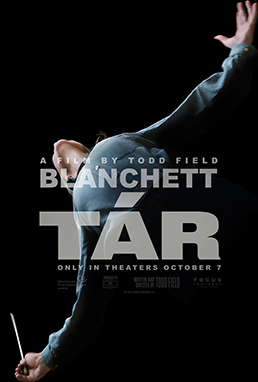Tár has been on my mind. A Todd Field film released at the end of last year; much talked about, though receipts suggest not seen nearly as much – albeit more so of late (award season!) and much more so since its wider release outside of the US. And looked upon mostly favorably and sometimes not. For now I can only add that it says much about these fractious times that a film about an absolutely not-nice but lauded female conductor – that all agree is brilliantly portrayed be Cate Blanchett – could be hauled from the creative space of the movie theater and plunged into the vitriolic and intransigent arena of the culture-war theater. I will see it and then have my say. (Though be warned my impartiality is not assured: most anything with Blanchett – with the exception of Armani ads! – is okay by me. I like to think we sound alike.) And have been encouraged to do so by a just read piece by Nicholas Spice in the LRB (Vol. 45 No. 6 · 16 March 2023) that broadly considers the art of conducting through Field’s film, a recent translation and commentary of Richard Wagner’s essays “On Conducting” (amazingly open access at JSTOR) and an experiential memoir by Alice Farnham.
There is probably no reason Spice should mention Ethel Smyth in his essay, but I would not have minded her spirited and stubborn presence; for she, too, has been fluttering around in my head. In the midst of my continuing Virginia Woolf stuff, I have been occupied with that period at the beginning of the 1930s during which Woolf found herself the object of the affections of the celebrated composer, conductor and suffragette; the attentions of whom aroused and irritated at the same time.
At the beginning of 1931 Woolf attended rehearsals of Smyth’s opera The Prison, adapted from a poem by her friend Henry B. Brewster, and then its London premiere performance on February 24. All did not go well. Accordingly, a very belated first recording in 2020 and its warm reception is of interest, and to be complemented by this essay, also from The Guardian, by Leah Broad.
Mysterious is this friend of hers, Henry Bennet Brewster, about whom information (in the internet anyway) seems scarce* but, when unearthed, is often in respect to his relationship with Smyth; his own work, seemingly, to have fallen into obscurity. Of any substance I can only find this 1962 essay by Martin Halpern in American Quarterly (pub. The John Hopkins University Press) held at JSTOR. (*Halpern’s essay suggests more could be learned by way of others, like another even more famous friend – Henry James. A task for another time. But the rediscovery of Brewster that Halpern hoped for sixty odd years ago seems not to have eventuated – unlike that of Smyth. Unless of course she has coattails to match her tailcoats!)
The Prison can be sampled below on Spotify; other interpretations of her work can also be heard there (with an account) including Mass in D from the BBC Symphony Orchestra; also resurrected and recorded for the first time in 2019.
In a diary entry made following the 1931 rehearsal of The Prison, Woolf writes a colorful -and comical – portrait of Ethel Smyth, which concludes with her being struck that Smyth, so practical and so strident in common discourse, could spin such music – so coherent, so harmonious – and asks the question: “What if she should be a great composer?” Well, that I cannot answer. But, what can be said, is that Dame Ethel Smyth has been granted that rare gift of an afterlife; enough qualified others over the years having concluded her music had merit and warranted reappraisal – and, this, long after her once radical presence in this mortal world had seemingly been confined to feminist folklore, footnotes – or even the diary and letters of Virginia Woolf.

